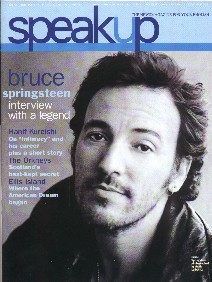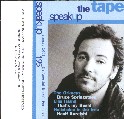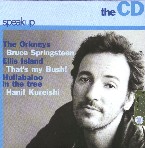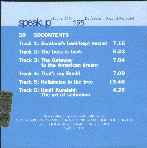SITE MAP
Bruce Springsteen InterviewSpeakUp magazine, June 2001
SpeakUp
is an Italian news magazine in English, for Italians who
want or have to speak English, to improve pronunciation
and comprehension. I'm sorry I can't help you get SpeakUp. Please send your enquires to [email protected] What follows is the published interview. The MP3 audio file is also available. |

|
Bruce Springsteen: I think that after the TOM JOAD tour and album, I thought I might do that again, I thought I might continue to work acoustically for a while. And I did write a lot of songs on that tour and I recorded about half a record, a little bit more of acoustic music. And, when I got into it... first of all it wasn't finished and I couldn't quite finish it at that time and also I was sort of... it had been a while since I'd, you know, played on stage with a rock band. And it was, it was such an essential part of what I did. And certainly it was a long time since I'd played with the E Street Band. And I felt like, gee, if I was going to do that again, this was... it was just the right time to do it, you know. And I called the fellows and we talked about it a little bit and I wanted to and I needed to connect with the part of me that, that does that very physical stage show, and those people, you know, were central to my whole life, you know. It was very unusual working with people that you worked with when you were, you know 19 And most people don't have that particular experience. Then I was turning 50 and I said, gee, you know, I just want to see where we can take it, you know, what we can do with it. That was pretty much it, you know.
Bruce Springsteen: "American Skin," basically, I was looking for a song for the end of the tour. Really, it was misrepresented and there was a few comments made by some police representatives before they'd heard it, or without hearing it, and it got turned into a bit of a media circus in New York for a while, you know. But it was just... for me I was just writing about, you know, it was a continuation of the work that I'd done in the past. I was writing about the place that I live and, you know, what defines "American-ness," you know. I think that I live in a country where a lot of people of color feel denied full citizenship, they feel denied full "American-ness," and that the Diallo case became a metaphor for that feeling. And it was just something I wanted to write about.
|
Bruce believes the advent of rock'n'roll in the 1950s
paved the way for the civil rights movement. |

|

|
Bruce Springsteen: It sort of woke me up as a kid, I think, you know. My mother was, always had the Top 40 radio on in the morning and he was, you know, the frontiersman in many, many ways, you know. I think that, I've sort of said in the past that that physicality which was which you look back now, it's funny that they were just... simply afraid to show it on television at the time, you know. He was also one of the precursors of the whole civil rights movement of the '60s, you know, where his personal integration, you know, was something that... it was new at the time, you know, it was new. And it was very, very inspirational: it did change the world, you know.
|
Another thing that Bruce and the great late Elvis have
in common is their ability to excite an audience. |

|
Bruce Springsteen: I think because I had the long history of, you know, the bar-playing and it's just I became good at it, you know, from having to come out at night and you had an audience that hadn't heard you and you had to win them over and there's something that happens live that you can't... you capture. I mean, this record we caught a lot of it, you know, and the film, too, I think the film, you get the essence of what... the band does live. If somebody, you know, 10 years from now wanted to know what we were about and what we did, I'd show them, "Well this is basically what we did and who we were" and it's just something I always thought mattered. I always enjoyed it tremendously, it was fun and I always thought it was important that I had a chance to have some impact on my audience and let them have impact on me, you know. It was something we did together and gave a lot of meaning to my life and, hopefully, that was, you know, we were good companions along the way for our fans, you know.



